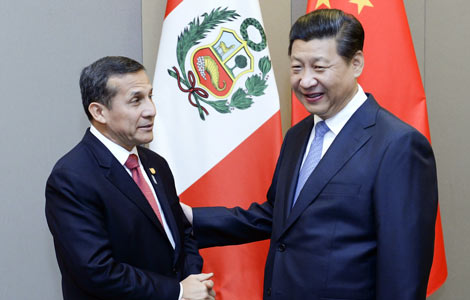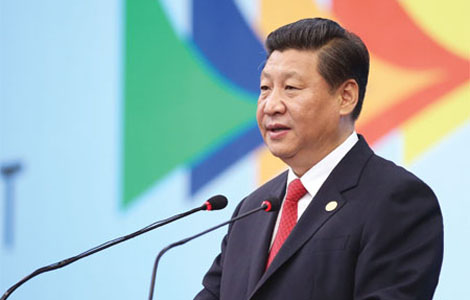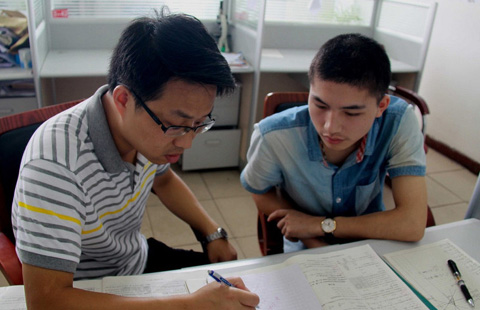Portuguese Baidu launched
Updated: 2014-07-18 13:53
By Zhang Yuwei in New York and Wu Jiao in Brasilia (China Daily USA)
|
||||||||
Chinese President Xi Jinping and his Brazilian counterpart Dilma Rousseff on Thursday jointly launched Chinese Internet search provider Baidu's Brazilian site in Portuguese to strengthen the two emerging markets' cooperation in technology.
The two heads of state started the new service during Xi's visit to the government palace Palcio do Planalto in Brasilia, part of his first trip to South America as head of the world's second-largest economy.
Xi said China wants to strengthen the strategic partnership with Brazil for a prosperous future for the two emerging economies.
Echoing Xi's point, Rousseff said the relationship between Brazil and China is developing at an unprecedented pace as it diversifies areas of cooperation.
Baidu had announced its plan to tap into overseas markets including Brazil, Egypt and Thailand early this year. By launching the Portuguese service in Brazil, the company aims to consolidate its brand in the Brazilian market.
Baidu's move into the Latin American market like Brazil shows that Chinese firms - of various industries - are strengthening their strategies in globalizing their brands. Many of these Chinese companies, however, face competition with long-established Western brands. In Brazil, for example, nearly 90 percent of all Internet searches are captured by Google, Baidu's competitor for its newly-launched Brazilian service.
Zhiqun Zhu, director of the China Institute and professor of political science and international relations at Bucknell University in Pennsylvania, said Baidu's reception in Latin America will largely depend on its name-recognition and applicability.
"This appears to be part of China's global strategy to 'go out' and invest in the global market, rather than a direct competition with Google," said Zhu.
"At this stage, I think it is probably more symbolic of Chinese businesses' global ambitions than yielding tangible commercial profits for Baidu," he added.
In addition to a search bar, the landing pages to the site offer direct links to popular services such as Facebook, YouTube, as well as Hao123, Baidu's own local web directory. Besides web search, the site also provides different features such as image and video search and language translation.
The development pace of Latin American economies has been attracting foreign investors to expand their portfolios, said Domenico Lombardi, director of the global economy program at the Center for International Governance Innovation in Canada.
"China is going toward becoming an 'exporter' of technology services and is no longer just importing IT technologies from other countries as it has been so far," said Lombardi.
"The challenge for this new search engine is to what extent it can be tailored for local realities beyond the language service," Lombardi said.
Founded in January 2000 in Beijing, Baidu controls around 80 percent of the search-engine market in China. It opened an office with about a dozen employees in Brazil at the end of 2013 to prepare for the new service launch. The company started its first international expansion in Japan in 2007.
Following the debut in Brazil, Baidu plans to move into other countries in the region, such as Argentina, Chile and Mexico, which are the strongest economies in Latin America, said the company.
Contact the writers at wujiao@chinadaily.com.cn and yuweizhang@chinadailyusa.com
(China Daily USA 07/18/2014 page3)
Most Viewed
Editor's Picks

|

|

|

|

|

|
Today's Top News
China 'shocked' at Malaysian plane crash
Portuguese Baidu launched
Malaysian airliner downed in Ukraine, 295 dead
Xi promotes cooperation on railway across South America
China urges U.S. not to abuse trade system
Couple's $15m to Harvard starts $100m fund for needy
China, US agree to boost cooperation on fighting terrorism
China increases holdings of US securities
US Weekly

|

|














